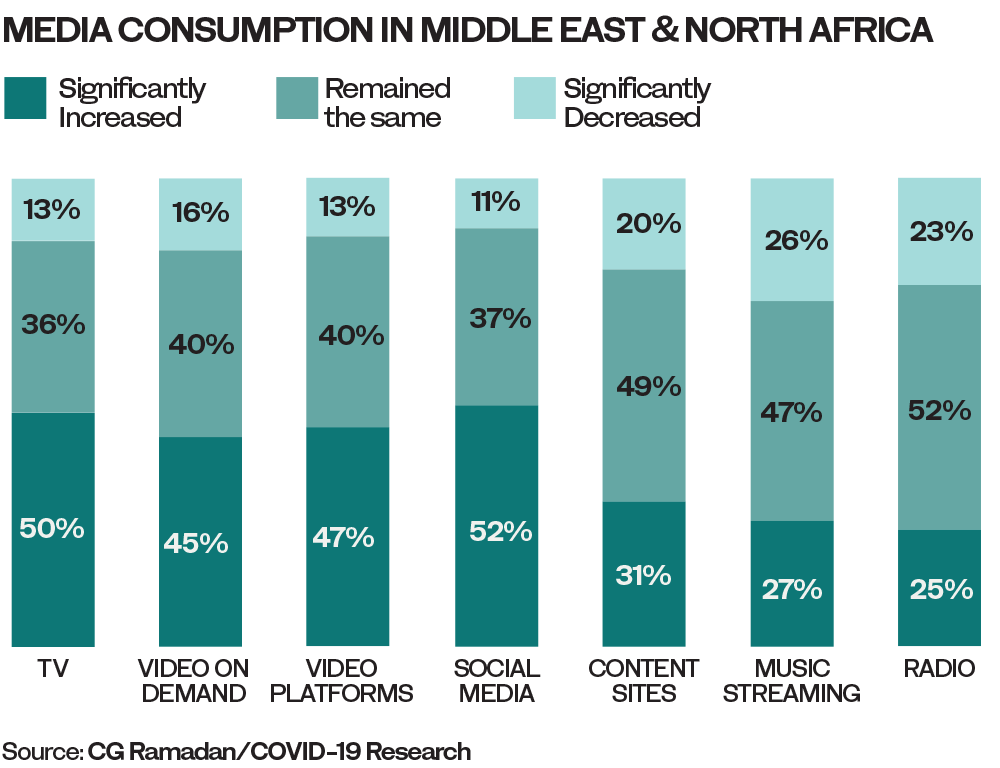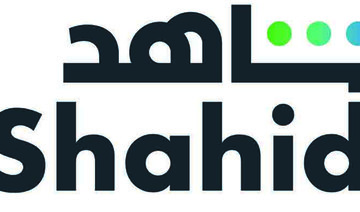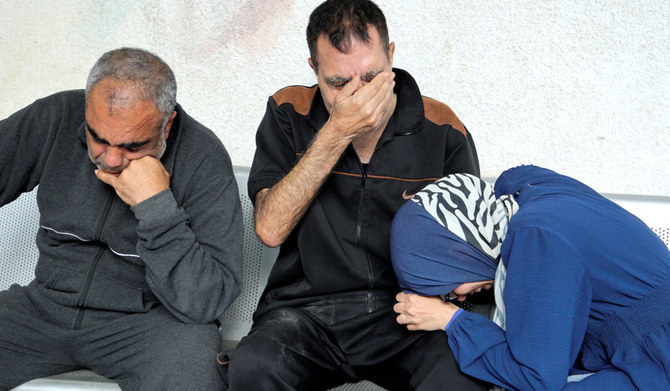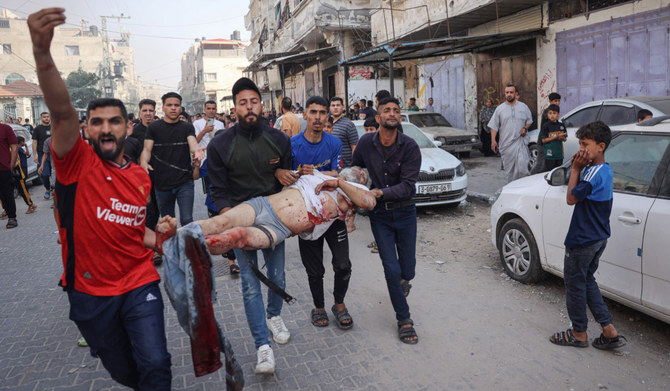DUBAI: Temporarily transporting your mind away from the humdrum routine of reality to the more exciting universe offered by television has proven an extremely popular activity during the coronavirus pandemic.
Since March 1, unplanned closures of schools, offices, entertainment services and other public spaces across the world have resulted in more and more people spending extended hours at home in front of screens.
With few sources of accessible entertainment beyond the world of TV shows and movies, streaming services and television networks have predictably experienced an extraordinary surge in viewership in the Middle East, leveraging the opportunity to draw millions of customers into a COVID-free world of leisure.

A prime example is Netflix, which saw its best quarter yet for subscriber growth, adding a record 15.8 million subscribers worldwide during the first few months of the pandemic.
In the UAE alone, the streaming service reported a 26 percent increase in viewership during the month of March, according to the country’s Telecommunications Regulatory Authority.
Similarly, MBC’s Shahid OTT audiences grew threefold during March and April, with the Shahid VIP segment reporting 10 times the audience growth.
Another example is the STARZPLAY streaming service, which recorded strong growth in the number of unique users from 2019, peaking at 141 percent in April 2020 at the peak of the pandemic.
“Compared with March 2019, the number of STARZPLAY app installs in March 2020 increased by 328 percent and in April 2020 by 486 percent. Content consumption in March 2020 increased by 230 percent over the same period in 2019 and in April 2020 by 340 percent,” Maaz Sheikh, CEO and co-founder of STARZPLAY, told Arab News.
******
READ MORE: INTERVIEW: CEO Maaz Sheikh sees business soar as Saudi viewers turn to streaming services
******
“The entire industry benefited during the stay-at-home period and especially during Ramadan, as consumption picked up with more people spending time at home.”
Additionally, the Orbit Showtime Network (OSN) streaming service reported a 900 percent increase in consumption of content across all genres between March 1 and April 26.
With their timely launch of the Disney Plus channel in March, original Disney movies made up 75 percent of the top family films viewed during the same period.
“We’ve seen strong engagement numbers over the past few months. Saudi Arabia specifically saw an average of over five hours of engagement per subscription, per day. Over 50 percent of new downloads have come from Saudi Arabia, followed by the UAE and Kuwait,” Zahra Zayat, senior vice president at OSN, told Arab News.
“We felt from what our numbers showed us that people were hungry for content and they were just grasping everything that was put in front of them.”
A 35 percent increase in screen time was also reported across OSN’s linear channels, with news channels specifically seeing a 250 percent increase in viewing time.
Yet, despite the initial spike, the pandemic did not generate a consistent demand for news, says Zayat.
“The increase was stronger and larger in other areas and genres almost as if people got tired of watching the news and had this fatigue from hearing about the pandemic,” she said, noting the news viewership continued to drop during the summer months.
However, with a larger audience leaning towards “binge-worthy” and “comfort” TV content, spending long hours plonked in front of a screen has quickly become what may be a temporary or long-term habit in many households.
According to Dr. Saliha Afridi, clinical psychologist and managing director of Lighthouse Arabia in Dubai, the trend can be attributed to the fact that many people have chosen television “as their go-to item for distraction and numbing from difficult emotions” during the pandemic period, and more specifically during lockdowns.
“By watching TV, they are transported into the lives of other people and dissociated from their own worries or sadness, creating temporary relief,” she told Arab News.
Afridi said that many streaming networks retain audience engagement through sophisticated algorithms, such as automatically starting the next episode, which draw in binge-watchers.
However, the impact of binge-watching on viewers during the pandemic can go one of two ways.
“For people who have addictive tendencies and use TV, which is a socially sanctioned addiction, their addiction is most likely worsened during the pandemic where there aren’t many opportunities to do anything else other than stay home and watch TV as a source of entertainment,” said Afridi.
“Others, who are hungry for social connection, outdoor physical activity, traveling, and other entertainment will most likely prefer that over TV once going outside with ease is a possible option.”

Zahra Zayat, senior vice president at OSN. (Supplied)
Moreover, the pandemic has also created new habits when it comes to popular viewing times.
OSN saw a 100 percent jump in viewings between the hours of 3 a.m. and 6 a.m. during the first six weeks of the pandemic, during which many countries in the Middle East were under tight lockdowns and quarantine.
“Historically, the peak time would start at 8 p.m. until 1 to 2 a.m. However, during this time, the peak period was starting at 6 p.m. and ending at 5 a.m. the next day … so our engagement went up by more than 11 times … with the maximum appetite coming from Saudi Arabia,” said Zayat.
She said some of the most popular titles were all-time favorite series, including “Game of Thrones,” “Grey’s Anatomy” and “Westworld,” which drew in old and new fans.
Titles like “Aladdin,” “Avengers: End Game” and “The Lion King” also continued to top the most-viewed content on the streaming app.
However, a rise in views was also reported in a few of the less popular categories during the pandemic, as some viewers proved more inquisitive and ventured out to genres such as reality TV, cooking shows and documentaries.
Similarly, STARZPLAY streaming services saw a significant increase (20 percent) in the number of total viewing hours, particularly among Saudi unique users, who reported a rise in the number of hours per user, from 11.83 hours in January 2019 to 18.06 hours in May 2020.

A spike in consumption of family content such as Disney classics and Warner Bros. favorites was reported, with Arabic content also growing five-fold in popularity across the MENA region during the first few months of the pandemic. (Reuters/File Photo)
A spike in consumption of family content such as Disney Classics (DC) and Warner Bros. favorites was reported, with Arabic content also growing five-fold in popularity across the MENA region during the first few months of the pandemic.
“We have also seen a growing appetite for DC content in the region, especially box sets. As per our recent viewership analysis, 42 percent of our viewers are binging on DC shows,” said Sheikh, referring to a notable interest in crime-scene investigation shows among DC fans in Saudi Arabia.
The top three most viewed shows among STARZPLAY viewers were “Vikings,” “Power” and “The Big Bang Theory.”
However, while OTT platforms and TV channels may seem to be thriving during the pandemic, one downside has been a drop in advertising revenues during the second quarter of the year, which coincided with the month of Ramadan.
According to media investment company Group M’s mid-year report for the MENA region, which forecasts the future of investments in the Middle East, TV ad spending across all countries will be down 29 percent in 2020 compared with 2019.
Overall, the average time spent on news and movie channels during the first period of the pandemic and Ramadan had risen by 30 percent, while entertainment channels saw an increase of between 20 and 30 percent.
Yet, despite the growth in TV content consumption in countries such as Saudi Arabia, Egypt and Morocco, investment in the sector dropped by 30 percent compared with last year.
This can only mean one thing: As the pandemic hits somewhat of a plateau, with many offices and schools reopening, the main focus for many TV networks and streaming services is to keep their large “quarantine” audiences hooked and subscriber behavior up – that is unless another wave of infections hits this winter.
--------------------------
Twitter: @jumana_khamis

























